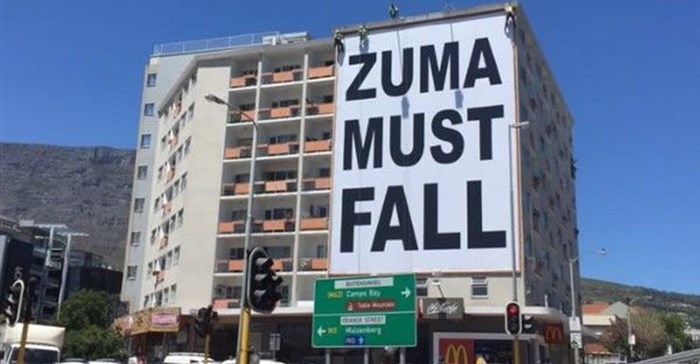
Top stories


ESG & Sustainability#BudgetSpeech2026: SRD grant unchanged, other Sassa social grants see hike
11 hours



More news












ESG & Sustainability
South Africa’s carbon tax should stay: climate scientists explain why










The building, which sits at the Long and Kloof streets intersection, has displayed some controversial billboards including the 2016 Zuma must fall billboard.
When Independent Outdoor Media (IOM), owners of Overbeek Signs, which owns the billboards, originally leased two advertising spaces on the Overbeek Building from its body corporate in 1999 and 2000, the City allowed it to do so as per the by-laws at the time.
When the authorisations lapsed in 2004 (March) and 2005 (November), IOM however continued its advertising, paying any fines and temporarily removing any advertisements, and despite various efforts, the City was unable to enforce compliance.
Then in January 2022 the Western Cape High Court declared the billboards unlawful and ordered Overbeek Signs to remove the billboards at its own cost within 15 court days of the service of the court order.
However IOM continued to ignore the ruling and the City went to the Constitutional Court. IOM then also appealed the earlier decision.
Now the Constitutional Court has ruled in favour of the City of Cape Town, enforcing the Western Cape High Court’s original decision.
The Constitutional Court has ruled that the City was within its rights, as prescribed by the by-law, to regulate outdoor advertising, and the billboards must be removed within two weeks.
In the ruling the Court added that the City did not need the National Trade, Industry and Competition Minister’s authority to promulgate the outdoor advertising by-law.
The Court dismissed the appeal with IOM responsible for the costs, including the City’s costs.
The City welcomed the decision, with Alderman Eddie Andrews, City’s deputy mayor and mayoral committee member for spatial planning and environment, quoted on the Town Today website site saying he welcomed the ruling as a victory for preserving Cape Town’s unique visual, historical, and cultural value.
“He emphasised the need to promote the city’s sense of place, heritage, scenic routes, and tourist destinations. While recognising the economic opportunities offered by outdoor advertising, he stressed the importance of proper placement.”
On the site it also stated that “With the by-law in effect, outdoor signage companies and other entities using outdoor spaces for advertising must comply with the regulations.
“The City encourages all parties to submit applications for outdoor signage before installation, thus avoiding punitive measures or unnecessary costs.”
The site statement further says that this ruling marks a significant development for municipalities seeking to balance economic growth with preserving their cultural and natural environments.
“Cape Town’s ability to regulate outdoor advertising without external interference demonstrates the autonomy and responsibility local governments hold in safeguarding their communities’ unique characteristics.
“The Constitutional Court’s judgment serves as a reminder of the importance of striking a balance between fostering economic opportunities and nurturing the city’s rich cultural and historical tapestry.
“It is this delicate equilibrium that will ensure Cape Town remains a vibrant, thriving, and attractive destination for locals and visitors alike.
In a News24 article, Andres says he was imploring the outdoor advertising industry to accept the Constitutional Court’s judgment and to comply with the City’s Outdoor Advertising and Signage By-law.
"We will closely monitor this space and take action if needed," he added in the article.
The owner of IOM, Brent Dyssel, is quoted in the same article saying that the City had elected to "publicly misrepresent facts surrounding their signage by-law when it came to erecting the Zuma Must Fall banner at the top of Long Street in 2016".
He says: "Had the City rather proactively rectified the voidness issue when it was brought to their attention in mid-2015, the occurrences surrounding that particular display could have been avoided.
“Saying this, I’m glad all of this has been ratified. We hope this paves the way for a healthier private industry and public relationship."
He adds: “I’m really proud of IOM for persevering with the litigation all the way to Constitutional Court, to have the voidness of all by-laws promulgated in terms of the National Building Regulations by all SA municipalities, regularised made valid."
